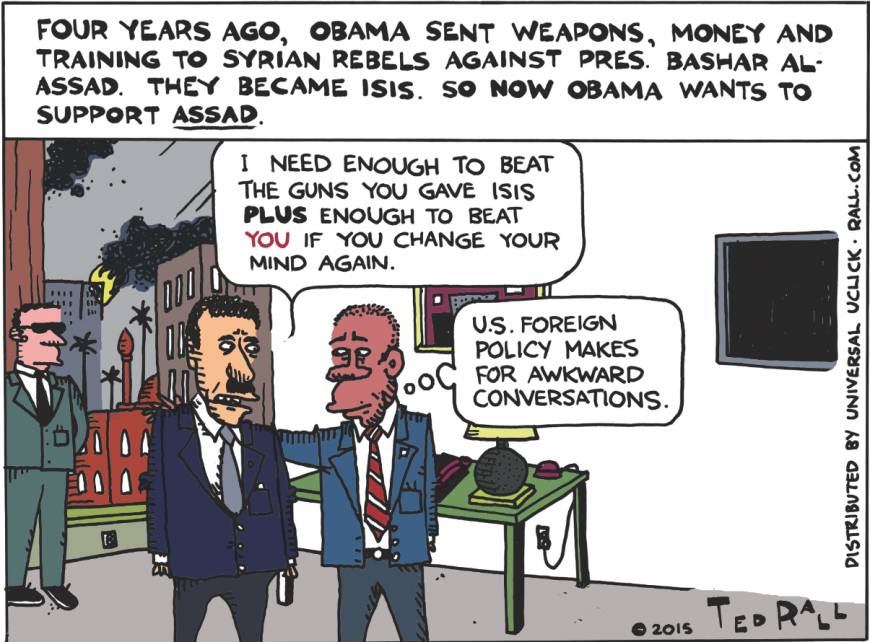
William Pfaff
An American journalist based in Paris, William Pfaff writes frequently on foreign affairs. © 2015 Tribune Content Agency
The first foreign policy speech given by a major Republican presidential prospect, Jeb Bush, in mid-February, was notable for its display of ignorance about the world and its menaces — unfortunately a common Republican characteristic.
Among these was the claim that the army of the Islamic State group numbers some 200,000 men under arms, 10 times the number generally accepted in professional and intelligence circles.
Bush said the Islamic State is a new phenomenon. Actually it derives from the so-called al-Qaida in Mesopotamia, whose existence in 2003 was notoriously cited as a motive for invading Iraq.
Bush also blamed President Barack Obama for the continuing shambolic condition of Iraq, claiming that he refused to keep American troops there after 2011. In fact, Obama had nothing to do with it. The U.S. withdrawal was dictated by the 2008 Status of Forces agreement between the Iraqi government and … President George W. Bush.
Despite these errors, Jeb Bush is better informed than most members of his myth-addicted party.
Consider the credulity and ignorance Republicans displayed at the congressional address of Israeli Prime Minister Benjamin Netanyahu. As the mendacious Netanyahu delivered a twisted discourse on the nuclear weapons negotiations with Iran, Republican senators and representatives barked like well-trained poodles.
There are few politicians in Washington, including Hillary Clinton, who will admit that their support for the 2003 Iraq invasion and the later Libyan intervention overthrowing Moammar Gadhafi was wrong and not just a "mistake.”
Few of them are even aware that the Libyan affair was initiated by France, whose then-president, Nicolas Sarkozy, another credulous leader, was convinced by a self-promoting "philosopher,” Bernard-Henri Levy, that if France didn’t act there would be "genocide” in Libya. France began air attacks and convinced Britain to join.
Washington, dismayed to see Europeans acting on their own, demanded that it all be put under NATO command and an American general. That was a Democratic administration folly.
Libya was spared Levy’s genocide. Instead the country was ruined, its people driven into sectarian and tribal conflict, and Gadhafi’s immense stock of arms was pillaged and distributed to jihadist groups throughout northeastern and littoral Africa.
Politicians know shockingly little about foreign affairs, especially in the United States, where during the first century of its existence isolationism was prudently practiced.
The war with Spain (justified by a 19th-century version of an Obama-style "responsibility to protect” doctrine to justify seizing Cuba, other West Indian states and the Philippines) broke the isolationist spell. President Woodrow Wilson remade the U.S. as the morally crusading great power it remains.
One might ask if this spirit of crusade is being undermined today, as the U.S. becomes less dependent on Saudi oil, as neo-Zionist territorial expansionism and the spread of jihadism undermine the American infatuation with Israel, and as disastrous results pile up from Middle Eastern invasions and "democratization” efforts.
Unfortunately, as Washington tires of the Mideast, NATO is mobilizing to threaten Russia and undermine the Putin government by inspiring fear and unrest. This began in Ukraine and now involves extensive and large "training exercises” in Poland, the Baltic states, where U.S. heavy armor made its appearance, and on the Caucasian frontier.
NATO’s supreme commander, Gen. Philip Breedlove, who has been engaged in a propaganda campaign identifying Russia as the aggressor in Ukraine and a deadly menace to Poland and the Baltics, told a military forum in Brussels a few days ago about a new kind of warfare already in practice.
He called it "hybrid” war, a form of political-military subversion coupled with military expansion. It makes use of "diplomatic, informational, military and economic … tools to bring new kinds of pressures to attack the leadership of a nation,” and is particularly concerned with constructing a "narrative” of falsehoods to sustain such a campaign. Putin is a recognized practitioner of the art, with successes in Abkhazia, Transnistria and now the Donbass region of Ukraine.
But hybrid warfare is taught at the U.S. Army War College as well, and Breedlove and various State Department and Pentagon officials are playing their own version of the game in Ukraine — to the outrage of key European allies and even some within the Obama administration.
A report in The National Interest magazine March 21 by James Carden contends that a revolt is under way in the Obama administration over the question of whether to supply arms reinforcements to Kiev, presumably to break the truce and restart the civil war against the pro-Russian insurgents.
The president, Carden asserts, has "lost control” of his foreign policy, with the White House unable to dominate the faction in the State Department headed by the neoconservative Victoria Nuland, and the Pentagon and its chairmen of the joint chiefs of staff, Martin Dempsey, and supported by several important Washington think tanks.
If true, this puts the political nonsense in the Congress in the shade.



_jpg/250px-ElbeDay1945_(NARA_ww2-121).jpg)





